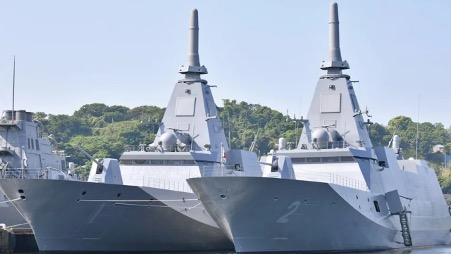Two decades of bipartisan effort to deepen defence ties with Japan made it possible to select the Mogami-class frigate for our navy. This is not just the right technical choice, it’s a big step forward in relations with Tokyo.
Do not underestimate what has happened here. This is Japan’s first major defence export deal as the country builds its own military capability.
For Australia, the decision ends an unfortunate fantasy that we must build and adapt surface warships at home. We can at least be confident that the first three frigates will be made in Japan. The big risks are on the Australian side, notably in transferring the build program for ships 4-11, as laid out by SAA’s Michael Shoebridge.
The Albanese government should now deepen relations with Japan by proposing a formal security alliance, building on the 2007 Joint Declaration on Security Co-operation and the 2022 Reciprocal Access Agreement.
An alliance treaty would formalise what’s already a de facto strategic partnership. Officials may baulk but the AUKUS nuclear submarine deal shows us that big strategic moves only come from political leaders with the imagination to step beyond existing policy.
Practical military co-operation is built on trust that results from regular exercising and training: days spent flying, sailing, manoeuvring over ground and learning each other’s tactics, techniques and procedures.
This requires a library of detailed agreements supporting intelligence and information sharing, deals for logistics support and access to bases, understanding how national laws impact on military co-operation.
This is the foundation built over the past two decades. Contrast that with the absence of trust that pervades our limited defence engagement with China. We have never moved beyond the most basic small-scale exercising, such as survival training courses or simple naval drills.
There is a reason why much of our so-called defence co-operation with Beijing involves dialogues without substance and swapping military bands: this is because Communist China is incapable of working with countries as genuine partners.
One can’t fake trust in military co-operation. With Japan we have created a military platform of trust, which recognises that the two countries, as major democracies and US allies, share a common strategic outlook.
At this stage the Mogami frigate has just been “selected” as a future choice for the navy. What remains is to negotiate an agreement with the builder, Mitsubishi Heavy Industries. That will be complex, but the Japanese government wants this outcome as much as Australia. A solution will be found.
Then there is the even more complicated task of working out how to shift production over to the Henderson shipbuilding precinct in Western Australia. At about the time the third Mogami is being built for us in Japan – that is in the early 2030s – I suspect the debate will shift and importing more frigates will look sensible.
For the Mogami project to work, we’ll need more Mitsubishi and less Henderson. The priority must be strengthening the navy – not job creation. Henderson will be busy enough with the late-2020s construction of army landing craft, some of which are as large as Anzac frigates.
The immediate opportunity is to deepen other aspects of defence co-operation. We should think big. If both countries are worried about Donald Trump’s impact on the alliances, here is a golden opportunity to apply some self-help.
Here are five steps that could jump-start significantly closer co-operation. First, let’s invite Japan to operate a squadron of its F-35 aircraft from RAAF Base Williamtown north of Newcastle, home of our F-35s.
Second, let’s invite a Japanese Maritime Self-Defence Force Mogami-class frigate to operate from HMAS Stirling, our western naval base. The sooner we start working with these vessels the better.
Third, we should look to long-term Australian Defence Force operations out of Japanese facilities. That might involve an army detachment with the HIMARS long-range artillery rocket system or a Special Air Service Regiment detachment.
Step number four would be to create a joint Australia-Japan military unit focused on armed-drone technology. Let’s be creative by bringing young, smart military minds together to see what they can come up with by way of new thinking on building deterrence and war-fighting skills.
Step five would be to formalise what has been happening under the radar and create an ANZUS-style treaty between Japan and Australia. This means publicly acknowledging that a threat to either country should be seen as a threat to both. That is just a statement of our current strategic reality.
Like ANZUS, a treaty with Japan should agree that the countries would act to meet the common danger in accordance with our respective constitutional processes.
This would not pre-commit either country to a specific course of action. It would simply acknowledge that we can be stronger together.
Beijing would hate this because it wants to keep Australia and Japan separated and therefore weaker, but Canberra and Tokyo should not give into China’s attempts to undermine our security.
Donald Trump would, no doubt, welcome two Pacific allies doing more for their own security. This would complement, not supplant, existing Australia and Japanese alliance co-operation with the US. It’s not that we need Trump’s approval, but it’s good that our self-help would strengthen credibility in Washington DC.
At relatively low budget cost, an Australia-Japan security treaty would help keep the Americans in the region, worry China and therefore strengthen deterrence, and lift the role of Canberra and Tokyo as two decent, consequential democracies focused on defending their own freedom and wider regional stability.
The Mogami decision shows that we are not alone – there is deep strength in closer Australia-Japan co-operation. We threaten no other country and enhance each other’s security.
This article was first published in The Weekend Australian.

